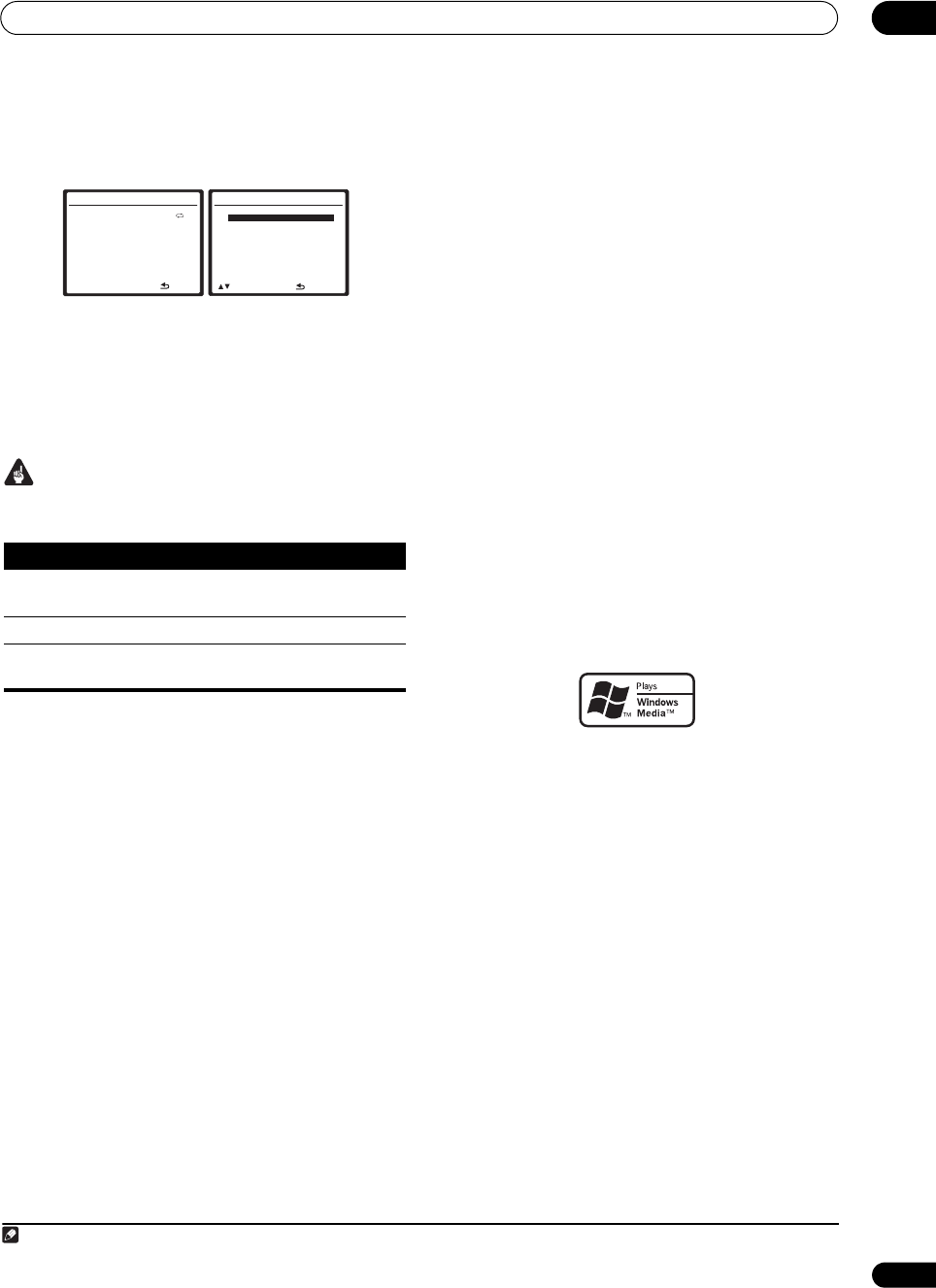
USB playback
06
33
En
1Press
RETURN
to display the folder/file list for the
USB device connected.
2Press
/
to select the file you want to play back,
and then press
ENTER
to confirm your selection.
• Press RETURN to switch to the upper hierarchy of the
current folder or file.
• To switch to the previous/next folder or file within the
current hierarchy, press /.
Important
If a USB ERR message lights in the display, try following
the points below:
• Switch the receiver off, then on again.
• Reconnect the USB device with the receiver switched
off.
• Select another input source (like DVD/CD), then
switch back to USB.
• Use a dedicated AC adapter (supplied with the
device) for USB power.
If this doesn’t remedy the problem, it is likely your USB
device is incompatible.
Compressed audio compatibility
Note that although most standard bit/sampling rate
combinations for compressed audio are compatible,
some irregularly encoded files may not play back. The list
below shows compatible formats for compressed audio
files:
• MP3 (MPEG-1/2/2.5 Audio Layer 3) – Sampling rates:
8 kHz to 48 kHz; Bit rates: 8 kbps to 320 kbps (128
kbps or higher recommended); File extension: .mp3
• WMA (Windows Media Audio) – Sampling rates:
8 kHz / 48 kHz; Bit rates: 5 kbps to 384 kbps (128 kbps
or higher recommended); File extension: .wma;
WMA9 Pro and WMA lossless encoding: No
• AAC (MPEG-4 Advanced Audio Coding) – Sampling
rates: 8 kHz to 48 kHz; Bit rates: 16 kbps to 384 kbps
(128 kbps or higher recommended); File extension:
.m4a; Apple lossless encoding: No
Other compatibility information
• VBR (variable bit rate) MP3/WMA/MPEG-4 AAC
playback: Yes
1
• DRM (Digital Rights Management) protection
compatible: Yes (DRM-protected audio files will not
play in this receiver).
About MPEG-4 AAC
Advanced Audio Coding (AAC) is at the core of the
MPEG-4 AAC standard, which incorporates MPEG-2
AAC, forming the basis of the MPEG-4 audio
compression technology. The file format and extension
used depend on the application used to encode the AAC
file. This unit plays back AAC files encoded by iTunes
®
bearing the extension ‘.m4a’. DRM-protected files will
not play, and files encoded with some versions of
iTunes
®
may not play.
Apple and iTunes are trademarks of Apple Inc., registered in the U.S.
and other countries.
About WMA
The Windows Media
TM
logo printed on the box indicates
that this receiver can playback Windows Media Audio
content.
WMA is an acronym for Windows Media Audio and refers
to an audio compression technology developed by
Microsoft Corporation. This unit plays back WMA files
encoded using Windows Media
TM
Player bearing the
extension ‘.wma’. Note that DRM-protected files will not
play, and files encoded with some versions of Windows
Media
TM
Player may not play.
Windows Media and the Windows logo are trademarks, or registered
trademarks of Microsoft Corporation in the United States and/or
other countries.
About DRM
DRM (digital rights management) copy protection is a
technology designed to prevent unauthorized copying by
restricting playback, etc. of compressed audio files on
devices other than the PC (or other recording equipment)
used to record it. For detailed information, please see the
instruction manuals or help files that came with your PC
and/or software.
Error What it means
USB ERR1
The power requirements of the USB device
are too high for this receiver.
USB ERR2 The USB device is incompatible.
USB ERR3 See USB interface on page 72 for more on this
error message.
USB
Play
Relax Your Body
Kevin Jackson
We are all one
128Kbps
MP3/VBR
0:15
List
USB We are all one
[
Relax Your Body
]
[
The Color of Life
]
[
Ain't Thang Wrong
]
[
Oh My God
]
[
Watcha Need
]
Return
Enter
Note
1 Note that in some cases playback time will not be displayed correctly.
VSX-LX50_HY.book Page 33 Thursday, March 8, 2007 1:18 PM


















